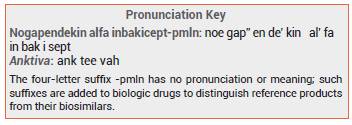ONLY
ARTICLE
Nogapendekin alfa inbakicept-pmln (Anktiva – ImmunityBio), a first-in-class interleukin-15 (IL15) receptor agonist, has been approved by the FDA for use with Bacillus Calmette-Guérin (BCG) for treatment of patients with BCG-unresponsive nonmuscle invasive bladder cancer (NMIBC) with carcinoma in situ with or without papillary tumors. Such patients generally undergo bladder tumor resection, followed by intravesical BCG treatment, but treatment failure and cancer recurrence are common. The adenoviral vector-based intravesical gene therapy nadofaragene firadenovec-vncg (Adstiladrin) and the immune checkpoint inhibitor pembrolizumab (Keytruda) are also approved for the same indication.1

MECHANISM OF ACTION — Nogapendekin alfa inbakicept is an IL15 receptor agonist that consists of nogapendekin alfa bound to inbakicept. Binding of the drug to its receptor causes proliferation and activation of natural killer (NK) and CD8+ killer T cells, which attack tumor cells. It also activates CD4+ T helper cells, which enhance proliferation of memory killer T cells.
CLINICAL STUDIES — FDA approval of nogapendekin alfa inbakicept was based on the results of an unpublished single-arm trial (QUILT-3.032; summarized in the package insert) in 77 adults with BCG-unresponsive, high-risk NMIBC with carcinoma in situ with or without papillary tumors. All patients underwent transurethral resection of the tumor before receiving nogapendekin alfa inbakicept and BCG. A complete response was achieved in 62% of patients and 58% of responders had a duration of response ≥12 months.
No trials directly comparing nogapendekin alfa inbakicept with other drugs used for treatment of NMIBC are available.
ADVERSE EFFECTS — Dysuria, hematuria, urinary frequency and urgency, urinary tract infection, musculoskeletal pain, chills, pyrexia, and increases in creatinine and potassium levels can occur with Anktiva. Urine may appear red for the first 24 hours after receiving Anktiva and BCG.
PREGNANCY AND LACTATION — Nogapendekin alfa inbakicept has not been studied in pregnant women. Females with reproductive potential should use effective contraception during treatment and for one week after the last dose. No data on the presence of the drug in human breast milk or on its effect on the breastfed infant or milk production are available.
DOSAGE, ADMINISTRATION, AND COST — Anktiva is supplied in 400 mcg/0.4 mL single-dose vials. The recommended induction dosage is 400 mcg administered intravesically with BCG once weekly for 6 weeks. Anktiva should be retained in the bladder for 2 hours and then voided. If a complete response is not achieved at 3 months, a second induction course can be administered. The recommended maintenance dosage is 400 mcg administered intravesically with BCG once weekly for 3 weeks at months 4, 7, 10, 13, and 19. Patients who have an ongoing complete response at month 25 and later can receive the drug with BCG once weekly for 3 weeks at months 25, 31, and 37. The maximum duration of treatment with Anktiva is 37 months. The wholesale acquisition cost (WAC) for one dose of Anktiva is $35,800.2
- In brief: Adstiladrin – a gene therapy for bladder cancer. Med Lett Drugs Ther 2023; 65:e40.
- Approximate WAC. WAC = wholesaler acquisition cost or manufacturer’s published price to wholesalers; WAC represents a published catalogue or list price and may not represent an actual transactional price. Source: AnalySource® Monthly. June 5, 2024. Reprinted with permission by First Databank, Inc. All rights reserved. ©2024. www.fdbhealth.com/drug-pricing-policy.
